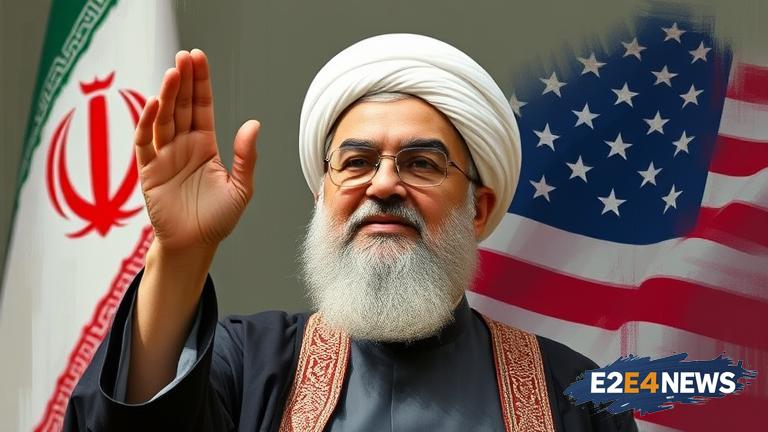In a recent statement, Iran’s Supreme Leader Ali Khamenei expressed his concerns regarding the United States’ intentions towards Iran. Khamenei believes that the US is seeking to exert control over Iran, forcing the nation to obey its demands. This statement comes amidst heightened tensions between the two countries, with the US imposing strict sanctions on Iran. The sanctions, which target Iran’s oil and banking sectors, have had a significant impact on the country’s economy. Khamenei’s statement suggests that Iran will not back down in the face of US pressure, and will continue to resist American influence. The Supreme Leader’s comments were made during a meeting with Iranian officials, where he emphasized the importance of national unity and resistance against foreign interference. Khamenei also criticized the US for its role in the region, accusing it of seeking to dominate and control the Middle East. The US has been actively involved in the region, with a significant military presence in several countries. Iran, on the other hand, has been seeking to expand its influence in the region, particularly in countries such as Iraq and Syria. The conflict between the US and Iran has been ongoing for several years, with both countries engaging in a war of words and proxy battles in the region. Despite efforts to negotiate a resolution, the situation remains tense, with both sides refusing to back down. Khamenei’s statement is likely to further escalate tensions, as it suggests that Iran will not compromise on its principles. The US has been seeking to isolate Iran internationally, with several countries imposing sanctions on the nation. However, Iran has managed to maintain its relationships with several key allies, including China and Russia. The European Union has also been seeking to maintain its ties with Iran, despite US pressure to impose sanctions. The situation remains complex, with multiple parties involved and competing interests at play. As the conflict continues to unfold, it remains to be seen how the situation will develop. One thing is certain, however: the tensions between the US and Iran will have significant implications for the region and the world at large. The US has been seeking to contain Iran’s nuclear program, which it believes poses a significant threat to regional stability. Iran, on the other hand, maintains that its nuclear program is for peaceful purposes only. The International Atomic Energy Agency (IAEA) has been monitoring Iran’s nuclear activities, and has reported several instances of non-compliance with international agreements. The situation is further complicated by the presence of other regional actors, including Saudi Arabia and Israel. Both countries have been actively involved in the conflict, with Saudi Arabia seeking to counter Iranian influence in the region. Israel, on the other hand, has been seeking to prevent Iran from developing a nuclear weapon. The conflict has significant implications for the global economy, particularly with regards to oil prices. Iran is a major oil producer, and any disruption to its oil exports could have significant consequences for the global market. As the situation continues to unfold, it remains to be seen how the conflict will develop. One thing is certain, however: the tensions between the US and Iran will have significant implications for the region and the world at large.
